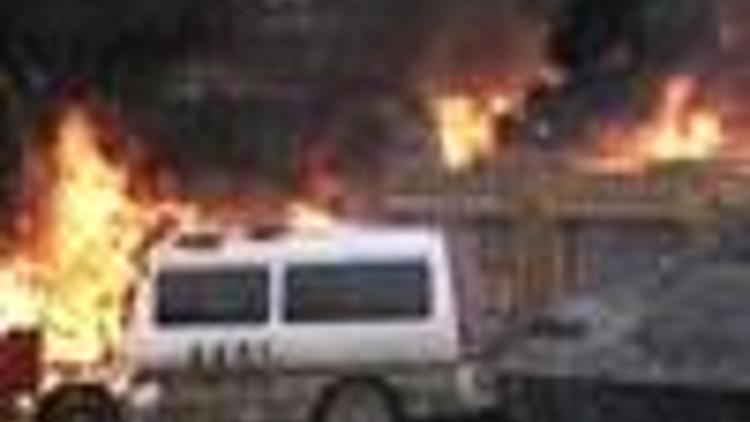UN and NATO troops clash with Serbs in Kosovo
Güncelleme Tarihi:

NATO troops came under fire during Serb riots in the northern Kosovo flashpoint of Mitrovica on Monday, in the worst violence in the territory since the Albanian majority declared independence last month.
The riot posed a direct challenge to NATO, the United Nations and Kosovo's fledgling European Union justice mission, underscoring fears in the West that Kosovo could be heading for ethnic partition one month after breaking away from Serbia. �
A U.N. spokesman said the riot "crosses one of the red lines that had clearly been articulated by the U.N. to the leaders of Kosovo Serbs in the north and to officials in Belgrade." A U.N. police spokesman said 25 officers were hurt. But Serbia blamed the U.N. and NATO for heavy-handed action and increased the level of security on its borders, warning that the highly volatile situation risked provoking a fresh Albanian ''pogrom'' against Kosovo's 120,000 minority Serbs. The Orthodox church said Serbs were "again being killed". �
The Serb director of Mitrovica hospital, political hardliner Marko Jaksic, said three people of Serb nationality had been severely injured in the rioting. "One person has been shot in the head most probably by a sniper. The bullet went right through," he said. "The person is in very bad condition and we had to transport him to a hospital in Kragujevac in central Serbia." Two others were in very serious condition, Jaksic added.
The loyalist Serbian National Council of northern Kosovo called on Belgrade to "help Serb people and say that Kosovo is Serbia", its leader Nebojsa Jovic was quoted as saying. In an apparent hint at the forced partition the West fears, he said "there is a scenario" if people get killed, which could reach "a point from which there's no way back". �
LIVE AMMUNITION
NATO said troops had come under automatic weapons fire. "We used automatic weapons to respond but fired only warning shots," French spokesman Etienne du Fayet de la Tour said. "We shot in the air, not into the crowd," he added.
The violence began at dawn when several hundred U.N. special police backed by NATO peacekeepers stormed a U.N. court that had been seized by Serbs on Friday, and arrested dozens. Hundreds of Serbs fought back with stones, grenades and firecrackers, forcing the U.N. police to pull back and leave KFOR to face the rioters. Rioters attacked three U.N. vehicles, breaking doors and freeing around 10 of those detained in the raid, witnesses said. The police and troops responded with tear gas. Some U.N. vans with detainees were still in the courtyard of the compound, with dozens of Serb protesters outside blocking their exit.
"Eight French KFOR soldiers are injured with grenades, stones and molotov cocktails," said du Fayet de la Tour. The U.N. police force reported 25 officers injured. "After attacks with explosive devices suspected to be hand grenades, and firearms, the police are ordered to withdraw from the north of Mitrovica, while the situation will be taken over by KFOR," a U.N. police statement said.
In Serbia, the Interior Ministry "has raised the security level in the territory of Serbia to a higher level", the state news agency Tanjug quoted a ministry source as saying.
The raid to retake the court coincided with the March 17 anniversary of Kosovo Albanian riots against Serbs in 2004, in which 19 people were killed and hundreds of homes and churches burned in two days of chaos that caught NATO flat-footed. It was this flare-up that pushed the West to start talks on Kosovo's final status. In north Kosovo, the 35-nation KFOR has troops from France, United States, Denmark, Belgium, Greece, Estonia, Luxemburg and Morocco. The U.N. police includes Ukrainians and Poles.
Serbia's President Boris Tadic appealed to them to refrain from violence against Serbs, especially on the anniversary of what he called an Albanian "pogrom" against Serbs. Bishop Amfilohije, acting head of the Serb Orthodox church, said "the suffering of our people is continuing this morning in Mitrovica ... strongmen are continuing to kill our people".
In the Serbian capital Belgrade, meanwhile, police reinforced protection at embassies and government buildings ahead of planned protests on the March 2004 anniversary. Serbia's Minister for Kosovo Slobodan Samardzic called the U.N.-NATO raid a provocation. He said it violated a deal he had for the U.N. not to take any action before he got to Kosovo to discuss a plan "for resolving all issues between UNMIK and Serbia and in connection with Serbs in Kosovo".

